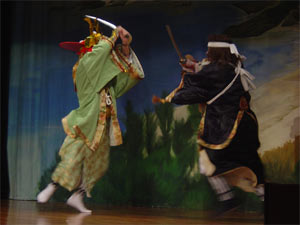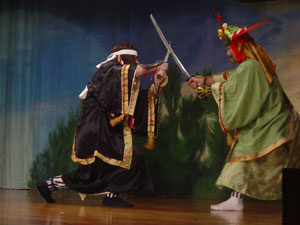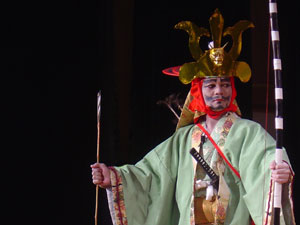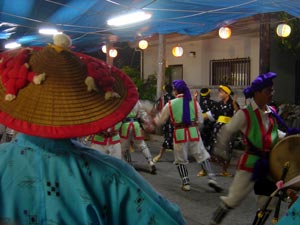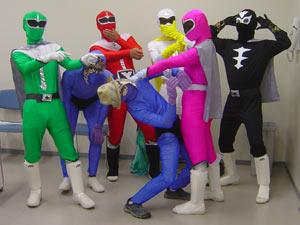Several times recently I’ve wondered where you draw the line between value-neutral anthropological observance of cultural differences and just going “No, no, no, no, no. That’s wrong. You’re doing it wrong. Here, give that here. Let me do it…”
I’ve often looked out at the school’s football pitch, at the scrubby loose earth that they play on, and thought it’s a shame that they can’t seem to get the grass to grow on it. The grass round the edge is really quite nice, healthy turf, but anywhere where sports are actually played, the ground is just bare, dusty earth. The topsoil must be loose, or something, I’d thought. The grass can’t get a firm hold, maybe, and just gets ripped straight up whenever anyone runs over it. I was wrong, though. Oho, I was wrong!
The first day of term, the first thing we do — everyone, pupils and teachers — is to go outside with bin bags and pull up all the grass that’s just beginning to sprout on the pitch. By the roots, just to make dead sure. I did this half-heartedly for a few minutes and then I turned to the school nurse and asked, trying and failing to keep the plaintiveness out of my voice, “Why? Why are we doing this?” The answer: “Sports day is coming up, and the team need to practice”.
Now perhaps I’m wrong. I mean, I’m no great sportsman, but is there anywhere in the world other than Japan where people choose loose dusty earth over turf for a pitch? Maybe athletics tracks go for something dusty over grass, I suppose… but the school keeps the entire field clear of grass, not just the strip round the outside.
I had a somewhat similar experience a few days ago when I went to a small party. They had red wine, which is unusual, because it’s much less common in Japan than the UK. So when I was offered a glass I said “yes! nice!” and the bloke who was sitting next to me reached for the bottle with one hand and plunged the other into the ice bucket, which caused me to let out out an involuntary “WOWOWOwowo wo wo! No ice! Um, just wine. Thanks.” Then, because I felt the need to explain my slightly violent reaction, I added something along the lines of “It’s just that… I’ve never seen that before, ice in red wine.” Which I suppose was intended as a tactful way of saying “No-one, no-one, no-one ever puts ice in red wine. It’s meant to be drunk at room temperature, damnit! That’s like, virtually a law.”
So, OK, you might say. So red wine isn’t that popular in Japan, and so unsurprisingly, people don’t necessarily know how you’re meant to drink it. Get off your high horse already, why don’t you Mister? It’s not the end of the world if an ice cube melts, cooling and diluting [‘ruining‘, you might also say] a glass of red wine. And I would agree with you. The reason I’m telling you about this is not to sneer like an arrogant chef at anyone’s culinary faux-pas, but because what happened next was interesting. Instead of taking on board the foreigner’s involuntary startle-reaction — in the way that I’d pause for thought if my way of drinking saké caused a Japanese person to involuntarily let out a shriek — everyone just sat back, sipping their iced wine, and said things like “oh, he’s a very strong drinker – he drinks it neat”, “he drinks everything neat”, “yeah, he doesn’t even drink his Scotch on the rocks!” I wanted to shout “No no no no noooo! That’s an aesthetic decision, that’s just because I prefer whisky without ice. Other people drink it with ice. But wine… wine… nobody, nobody ever – anywhere – drinks red wine with ice in it.” I wanted to point at the whole rest of the world and say “look, they don’t do that. They’re not doing it. None of them are. Only you. I’m not the funny one here. You are. You lot. Not me.”
Final and, in fact, far and away the least trivial anecdote in this trilogy… I walk into the Board of Education, and a young woman I’ve never seen before is sitting there sipping a cup of tea. “I saw you walking up here”, she says. “I nearly stopped and offered you a lift. Has your car broken down?”
“Oh don’t worry. I don’t have a car, but it’s so close it’s not even worth cycling – I usually just walk.”
“Close?” she said, in an ‘oh come on now, you must be joking’ tone of voice.
“Yeah, I mean, it’s only about two hundred metres” (in truth, it’s probably less than that)
“No way,” she said, “it’s much further.” She said this in the tone of voice you might use to talk to a wildly but harmlessly deluded person, to try to get them to snap out of it and realise where they are and what they’re saying.
I felt the situation slipping from my grasp.
“It is. It is close. Look. It’s just across there. You can see it out of the window. It’s really near.”
She turned her head very slightly, perhaps even let the school’s image briefly brush her retina, then snorted slightly and turned back to scrutinise me intensely for a few seconds. Then she said: “Your head is very red. The sun is very strong in Okinawa.”
AAAAAAAARRRRRRGGGHH!
I’m sorry, but this whole ‘you need a car to travel more than a hundred metres’ thing is crazy. Crazy, crazy, crazy. It’s also a belief that is universally held by all but one other person on the island, as far as I can make out. Teachers have been baffled that I often walk between my house and the school — a journey which can sometimes take as many as five minutes to complete. I have more than once been offered a lift when I said I was going to the post office, which is almost exactly halfway between my house and the school.
It seems to me that while there are obviously genuine vive la différence cultural differences that I would not only be an idiot to criticise, but which in fact are really what I’m here for, there are other times when I just want a referee to step in and say, “no, in fact, on this occasion, he’s right.” Deliberately ripping up grass to leave a layer of loose, pitted dusty topsoil. Putting ice in your red wine. Being baffled — utterly, incomprehendingly baffled — by someone who chooses to walk a little over a hundred metres rather than take a car. These things are (though to different extents) crazy. And, on some level, wrong (ok, the wine thing isn’t morally wrong, but it’s… it’s… just wrong). The thing is, ‘crazy’ is almost always defined by the majority. And that can leave you feeling distinctly uneasy when you look around for confirmation, and find that you’re the sole foreigner on a small island…
